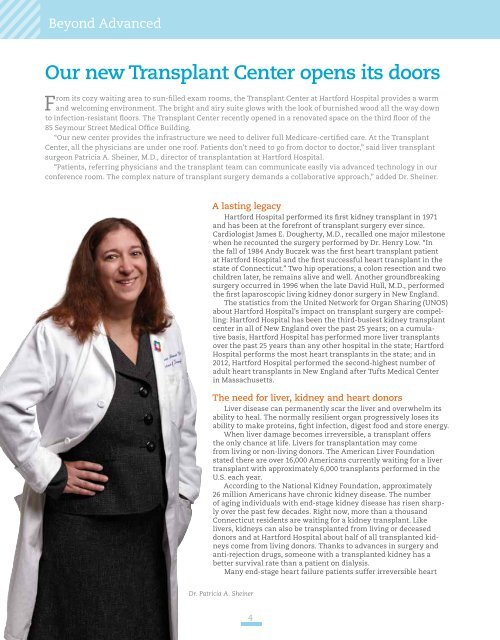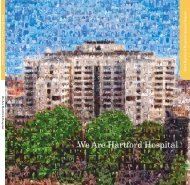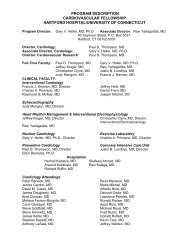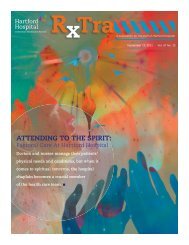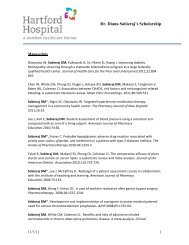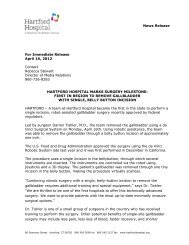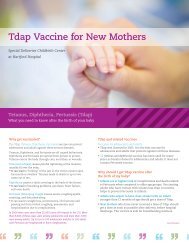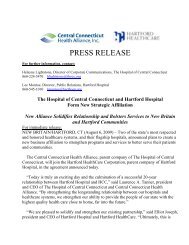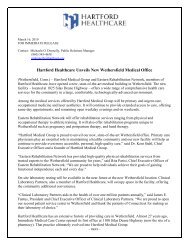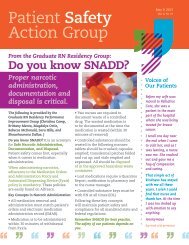Spring, 2013 - Hartford Hospital!
Spring, 2013 - Hartford Hospital!
Spring, 2013 - Hartford Hospital!
You also want an ePaper? Increase the reach of your titles
YUMPU automatically turns print PDFs into web optimized ePapers that Google loves.
Beyond Advanced<br />
Our new Transplant Center opens its doors<br />
From its cozy waiting area to sun-filled exam rooms, the Transplant Center at <strong>Hartford</strong> <strong>Hospital</strong> provides a warm<br />
and welcoming environment. The bright and airy suite glows with the look of burnished wood all the way down<br />
to infection-resistant floors. The Transplant Center recently opened in a renovated space on the third floor of the<br />
85 Seymour Street Medical Office Building.<br />
“Our new center provides the infrastructure we need to deliver full Medicare-certified care. At the Transplant<br />
Center, all the physicians are under one roof. Patients don’t need to go from doctor to doctor,” said liver transplant<br />
surgeon Patricia A. Sheiner, M.D., director of transplantation at <strong>Hartford</strong> <strong>Hospital</strong>.<br />
“Patients, referring physicians and the transplant team can communicate easily via advanced technology in our<br />
conference room. The complex nature of transplant surgery demands a collaborative approach,” added Dr. Sheiner.<br />
A lasting legacy<br />
<strong>Hartford</strong> <strong>Hospital</strong> performed its first kidney transplant in 1971<br />
and has been at the forefront of transplant surgery ever since.<br />
Cardiologist James E. Dougherty, M.D., recalled one major milestone<br />
when he recounted the surgery performed by Dr. Henry Low. “In<br />
the fall of 1984 Andy Buczek was the first heart transplant patient<br />
at <strong>Hartford</strong> <strong>Hospital</strong> and the first successful heart transplant in the<br />
state of Connecticut.” Two hip operations, a colon resection and two<br />
children later, he remains alive and well. Another groundbreaking<br />
surgery occurred in 1996 when the late David Hull, M.D., performed<br />
the first laparoscopic living kidney donor surgery in New England.<br />
The statistics from the United Network for Organ Sharing (UNOS)<br />
about <strong>Hartford</strong> <strong>Hospital</strong>’s impact on transplant surgery are compelling:<br />
<strong>Hartford</strong> <strong>Hospital</strong> has been the third-busiest kidney transplant<br />
center in all of New England over the past 25 years; on a cumulative<br />
basis, <strong>Hartford</strong> <strong>Hospital</strong> has performed more liver transplants<br />
over the past 25 years than any other hospital in the state; <strong>Hartford</strong><br />
<strong>Hospital</strong> performs the most heart transplants in the state; and in<br />
2012, <strong>Hartford</strong> <strong>Hospital</strong> performed the second-highest number of<br />
adult heart transplants in New England after Tufts Medical Center<br />
in Massachusetts.<br />
The need for liver, kidney and heart donors<br />
Liver disease can permanently scar the liver and overwhelm its<br />
ability to heal. The normally resilient organ progressively loses its<br />
ability to make proteins, fight infection, digest food and store energy.<br />
When liver damage becomes irreversible, a transplant offers<br />
the only chance at life. Livers for transplantation may come<br />
from living or non-living donors. The American Liver Foundation<br />
stated there are over 16,000 Americans currently waiting for a liver<br />
transplant with approximately 6,000 transplants performed in the<br />
U.S. each year.<br />
According to the National Kidney Foundation, approximately<br />
26 million Americans have chronic kidney disease. The number<br />
of aging individuals with end-stage kidney disease has risen sharply<br />
over the past few decades. Right now, more than a thousand<br />
Connecticut residents are waiting for a kidney transplant. Like<br />
livers, kidneys can also be transplanted from living or deceased<br />
donors and at <strong>Hartford</strong> <strong>Hospital</strong> about half of all transplanted kidneys<br />
come from living donors. Thanks to advances in surgery and<br />
anti-rejection drugs, someone with a transplanted kidney has a<br />
better survival rate than a patient on dialysis.<br />
Many end-stage heart failure patients suffer irreversible heart<br />
Dr. Patricia A. Sheiner<br />
4


